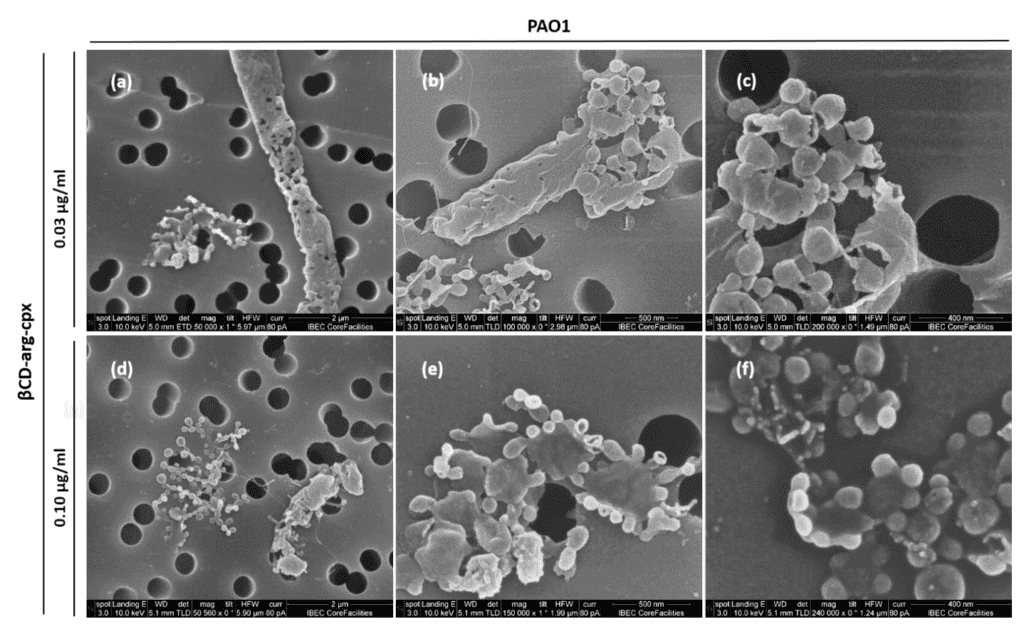In a new study carried out by researchers from the Institute for Bioengineering of Catalonia (IBEC), improved so that they are more effective in much smaller doses, which opens the possibility of developing new antimicrobial treatments in an innovative and affordable way. The study, published recently in the Communications Biology Journal of the Nature group, has been led by Eduard Torrents, principal investigator from IBEC and professor from the University of Barcelona (UB).
The lack of effective antibiotics is an increasingly serious threat to global health. During the last decades, just a few new antimicrobial agents have reached the market. A promising and affordable option to fill this shortage is the design of new functionalities for antibiotics already known or in disuse due to their toxicity. A recent study published at the journal Communications Biology of the group Nature, led by the researcher Eduard Torrents from IBEC and the University of Barcelona, together with researchers from the Institute Jozef Stefan from Slovenia, explores this option through the design and development of a complex formed by three molecules, including the antimicrobial ciprofloxacin. In this new format, the drug increases its efficacy, stability and reduces its toxicity, improving its usage as an antibiotic.
Reuse of antibiotics to solve a global problem
An easy and affordable way to redesign old antibiotics is include them in complexes capable of modifying some of their properties, such as the solubility, the stability, the bioavailable and the permeability, which are fundamental characteristics for them to be effective against bacteria. In this context, researchers have achieved the development of a new ternary complex in which the antibiotic ciprofloxacin binds on the hydrophilic surface of the cyclodextrin through an aminoacidic, arginine, which acts as a bond between both molecules. Compared with other less stable classical inclusion complexes, which only modify the solubility of the antibiotic, the ternary complex synthesized in this study is also more stable and efficient.

During the investigation, it has been proved that this new complex intensifies the interaction of the drug with the bacterial membranes and increases its bioavailability inside the cell, improving this way its antimicrobial efficacy and its safety profile. “Its release occurs in a more controlled way and allows it to be more effective with less quantity. Therefore, the treatment is less toxic to the body”, explains Torrents.
“Our redesign system could reduce the toxicity or increase the penetrative capacity of many antibiotic drugs that have been used for decades and are now obsolete.”
Eduard Torrents
The synthesis of this type of complexes from the cyclodextrin and in which molecules are used as a bond with the drug, has a great potential to improve the efficiency of antibiotics previously approved and used clinically for years. “This way, we could take advantage of what we already have and give it a new use, improving it, to achieve the effective antimicrobial treatments that we urgently need”, explains Torrents.
Further studies in this field would serve to explore all the possibilities available or achieve an increase in bioavailability of already known drugs, including their ability to develop effects on strains that are currently resistant to traditional antibiotics. Produced through simple chemistry, which does not require a high level of technology and is highly economical, this type of complexes could become very promising tools, capable of encouraging the pharmaceutical industry to dedicate efforts in this field, since the Lack of effective antibiotics globally is increasingly worrying.
Reference article:
Marija Vukomanovic, Lea Gazvoda, Mario Kurtjak, Jitka Hrescak, Blaz Jaklic, Laura Moya-Andérico, Maria del Mar Centra y Eduard Torrents. Development of a ternary cyclodextrin-arginine-ciprofloxacin antimicrobial complex with enhanced stability. Commun Biol 5, 1234 (2022). https://doi.org/10.1038/s42003-022-04197-9





